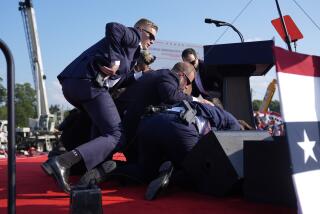COLUMN RIGHT : A President Isolated by Bureaucracy : Conflicting voices have been kept remote from Bush. He needs to hear from Main Street.
- Share via
What is it about the White House that creeps up on a handshaking, baby-kissing, backslapping politician and in a matter of months renders him an isolated, remote President? Of a sudden, one of nature’s most gregarious humans is alone, dependent on uniformed stewards for a cup of coffee and on a coterie of Washington-bred aides for the morning news?
George Bush was once famous for his network of friends who kept him up on the concerns of Main Street and for those little postcards he would send to them. Now, bear in mind, it is George Bush’s isolation that has dumped him into his current low estate.
“The Isolation of the President” has been an article of comment since the purple days of J.F.K., when it was grist for the poets. During the anguished days of L.B.J. and Richard Nixon it was grist for the psychoanalytically inclined. Soon students of the Bush Administration will be gravely concurring on the isolation of George Bush.
Ever since the Eisenhower presidency and concomitant with the growth of White House bureaucracies, presidents have been in danger of being mummified by their aides. The aides are attuned to the desiderata of Washington, Wall Street and such preserves of poppycock as the Kennedy School of Government. They are not attuned to Main Street or to any other normal setting in America.
Bush’s economy was marked for illness when he lost touch with working Americans and fell victim to his aides’ Beltway pieties about the federal deficit. Few people outside the Beltway were alarmed in the summer of 1990 by a deficit that, as a percentage of GNP, was slowly declining and was relatively small compared with those borne by other industrialized powers, including such economic colossi as Germany and Japan. But the aides around the President, being typical Washington bureaucrats, fretted about the deficit, and soon all the wisdom to be learned from America’s longest period of peacetime growth was heaved aside for a budget deal whose only achievements were higher taxes, higher deficits and economic stagnation.
I have recently taken soundings throughout Washington. It would be inaccurate to say that the President is totally isolated from normal Americans. He meets with them to sign presidential proclamations for such worthy causes as National Pickle Week or the Preservation of Duckpin Bowling. His schedule abounds with visits from, say, the National Turkey Assn., whose smiling eminences introduce him to the presidential bird. He meets with Italian Americans on their special day and with other ethnics, too. Championship sports teams stop by the White House, and the President now shops in public.
Yet such encounters, stimulating as they undoubtedly are, do not really break the White House bureaucrats’ hold on him. As long as the White House has a bureaucracy, the benefits and dangers of bureaucracy will circumscribe the President. This President has had able minds on his staff, for instance the deputy assistant for policy planning, James Pinkerton, and ex-economic adviser Lawrence Lindsey. They could have given him alternative views on the economy and his vacuous domestic policy. Yet it is in the nature of bureaucracy for the bureaucrat on top to isolate the President from conflicting views.
Pinkerton, Lindsey and all other conflicting voices have been kept remote from Bush for months, and so he remains in isolation. The smart money in Washington wagers the isolation will not be broken.
That surprises me somewhat, though I should not be surprised by the realities of Washington. Perhaps I am surprised because I can recall hosting a dinner with then-Vice President Bush back in 1987, during which he remarked that President Ronald Reagan should welcome regular meetings with outside experts capable of informing him of life outside the White House. During that faraway dinner, Bush observed that a White House staff tends to isolate the President. It is a condition, he told me, that the President must guard against.
Well, Mr. President, the move is yours. You live in a strange environment. Everyone who enters your presence seeks favors, even the turkey farmers, even the turkey. I suggest you avail yourself to some disinterested minds outside the government and beyond the special interests. They could at least apprise you of the concerns on Main Street.
More to Read
Get the L.A. Times Politics newsletter
Deeply reported insights into legislation, politics and policy from Sacramento, Washington and beyond. In your inbox twice per week.
You may occasionally receive promotional content from the Los Angeles Times.










